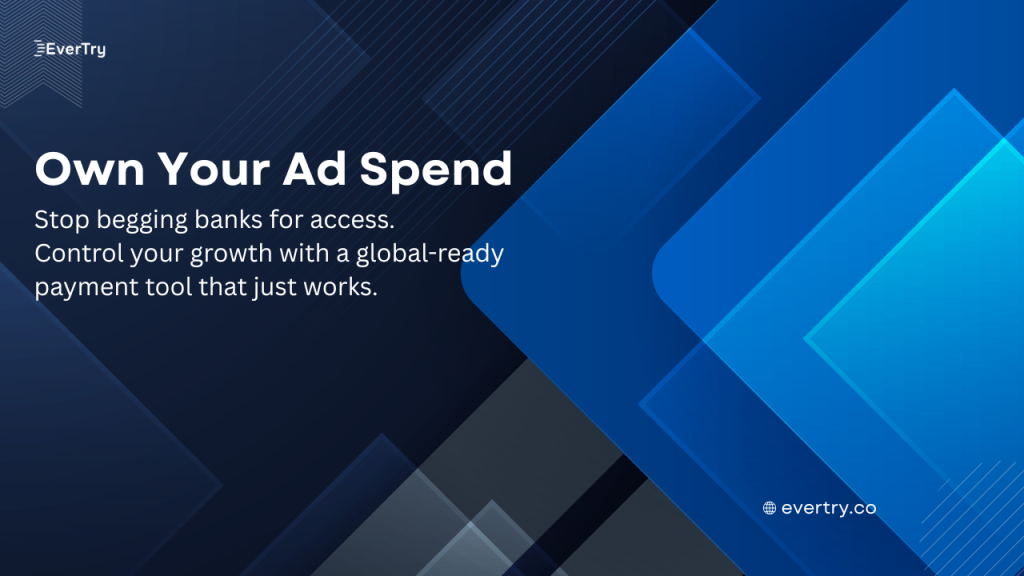Running ads on platforms like Meta (Facebook/Instagram), Google, TikTok, Snapchat, or X (formerly Twitter) is essential for growing a business or brand in Africa today. Whether you’re a digital marketer in Lagos, a fashion brand in Accra, or a tech startup in Nairobi, online advertising can put you in front of the right audience.
But there’s one big problem: paying for these ads.
Many Africans hit a frustrating wall, cards get declined, payments don’t go through, and ad accounts get suspended. Not because of bad credit or poor setup, but because local banks and currencies often don’t play well with international platforms.
If that sounds familiar, you’re not alone, and you’re not powerless either. In this article, we’ll break down why this happens and, more importantly, how you can fix it.
Why Are African Cards Failing on Meta, Google, TikTok, and Other Ad Platforms?
Let’s start with the big question.
Most major ad platforms charge in USD or other major foreign currencies. But many African bank cards are restricted to local currency use only, or they have monthly limits on international spending.
Here are a few common reasons African cards get declined:
- Currency mismatch: If your card is in naira, cedis, or shillings, but the platform charges in dollars, the transaction might get blocked.
- Foreign exchange limits: Central banks in countries like Nigeria have set caps or restrictions on how much can be spent abroad using local debit cards.
- 3D Secure issues: Some platforms require 3D Secure verification, which local banks may not support properly.
- Fraud protection triggers: Some banks automatically flag and block foreign payments, especially for online ads, thinking it’s fraud.
The result? You try to run ads, but the system says “payment failed”—over and over again.
The Hidden Costs of Card Declines for African Advertisers
At first glance, a failed payment might seem like just a temporary glitch. But over time, the impact adds up:
- Campaigns pause mid-way, killing momentum and wasting budget.
- You lose sales during the downtime when no one sees your ads.
- Clients get upset when you’re managing their ad accounts and can’t deliver.
- Your ad account could be suspended if the payment method keeps failing.
It’s not just frustrating, it’s costly.
What You Can Do When Your Naira/Rand/Cedi Card Fails
When traditional cards stop working, most people scramble for alternatives:
- Try cards from another bank (until those stop working too).
- Borrow a friend’s dollar card (not ideal or sustainable).
- Open a domiciliary account and get a physical dollar card (which often takes weeks, plus you need foreign currency to fund it).
These options work, sometimes. But they’re slow, unreliable, or too complicated for something as basic as paying for ads.
How Virtual Dollar Cards Solve the Ad Payment Problem
This is where virtual dollar cards come in.
A virtual dollar card is a prepaid, digital card denominated in USD. You fund it in advance using your local currency or crypto, and it works just like a regular Visa or Mastercard when paying online.
Here’s why they’re a game-changer for ad payments:
- They’re accepted worldwide, including Meta, Google, TikTok, Snap, and X.
- No surprises, you control how much you load, so budgeting is easier.
- Instant funding, no trips to the bank or paperwork needed.
- You bypass local card restrictions completely because the platform sees it as a USD card.
Advertisers across Africa, from freelancers to agencies, use virtual cards every day to run ads without interruption.
A Step-by-Step Guide to Paying for Ads With a Virtual Dollar Card
Here’s how simple it is to get started:
- Sign up for a virtual card provider (like EverTry or any reliable platform).
- Verify your identity, usually with a government-issued ID.
- Fund your wallet using local currency, bank transfer, or crypto like USDT.
- Create your virtual dollar card inside the platform.
- Copy the card details (card number, expiry, CVV).
- Add it to your ad platform as a payment method.
- Launch your campaigns, no more errors, no more delays.
Things to Look Out For When Choosing a Virtual Dollar Card Provider
Not all virtual card providers are created equal. Here’s what to check before signing up:
- Transparent fees – Know how much you’re being charged per transaction or load.
- Good customer support – In case something goes wrong, you want quick help.
- Funding options – Can you top up in naira, cedis, or crypto like USDT?
- Proven compatibility – Make sure the card works on platforms like Meta and Google.
EverTry: A Trusted Option Among African Advertisers
If you’re looking for a platform trusted across Africa, EverTry is one to consider.
- It lets you create virtual dollar cards easily.
- You can fund with local currency or USDT.
- It’s already helping thousands of users in Nigeria, Egypt, Ghana, Kenya, and beyond.
- Cards work seamlessly on Meta, Google, TikTok, Snap, and X.
We won’t tell you it’s the only solution, but it works.
Conclusion: You Deserve a Smoother Way to Run Ads
Paying for ads as an African entrepreneur or marketer shouldn’t be this complicated. But local restrictions, currency barriers, and payment errors can make it feel like an uphill battle.
Thankfully, virtual dollar cards provide a reliable workaround. They’re fast, flexible, and put you in full control of your ad payments.
If your local card keeps failing—or you’re tired of borrowing someone else’s—it might be time to switch to something built for global payments.
Because when your growth depends on running ads, your payment method shouldn’t be the thing holding you back.
